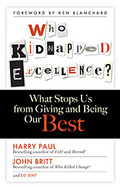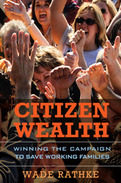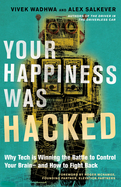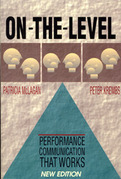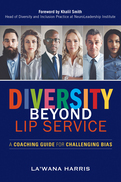Uses a clever and fun parable to identify what excellence is, how we lose it, and how we can regain it.
Who Kidnapped Excellence?Most companies talk about excellence, but what does excellence really mean? What specific attitudes and practices lead to excellence? Drawing on years of study and decades of experience, authors Harry Paul, John Britt, and Ed Jent have zeroed in on five core qualities of excellence. In this entertaining and enlightening book, they tell how to give and be your best in each of these five critical dimensions and foster excellence in your organization and in your life.
The book begins with a crime being committed: Excellence (personified) has been kidnapped, and Leadership assembles Excellence's team (Passion, Flexibility, Communication, Competency, and Ownership) and challenges them to work together to get their Excellence back.
And who is the culprit? Has Average kidnapped Excellence and replaced Excellence's team with his own: N. Different, N. Ept, N. Flexible, Miss Communication, and Poser? A mysterious ransom note sparks the struggle between Average and Excellence.
Integrated into this tale of organizational excellence is the story of Dave, a delivery man. The kidnapping causes Dave to contemplate his own life and relationships in a way that makes the paths of personal and organizational excellence cross and intertwine. Who Kidnapped Excellence? is a parable that helps organizations and individuals achieve their best in every aspect of their lives.
2009
• By the founder of ACORN, the nation’s largest grassroots community organization of low- and moderate-income people
• Goes beyond piecemeal solutions to present a holistic strategy for helping working people establish a solid economic foundation
• Draws on lessons learned from Rathke’s 40 years in the field
America’s safety net is torn and tattered. Income inequality continues to grow—the gap between rich and poor has expanded fivefold in the last 25 years. For millions of working families achieving basic middle class comforts has begun to seem as distant a dream as winning the lottery. What is needed, and what veteran organizer and ACORN founder Wade Rathke provides in this hard-hitting new book, is a comprehensive grassroots strategy to create what he calls citizen wealth: an enduring foundation on which working people can build a future that extends beyond paying next month’s rent.
Rathke shares breakthrough strategies that have enabled ACORN and other organizations help people secure the basics of citizen wealth—a house and a decent income—offering from-the-trenches advice on mounting successful living wage campaigns, battling unscrupulous and predatory lending practices, and developing new forms of worker organizations to protect wages and benefits. The anti-poverty programs still out there can provide critical support for citizen wealth-building efforts, but they’re woefully underutilized. Rathke shows how to cut through government indifference and bureaucratic obstacles to provide those in need with access to these vital resources.
But community organizations can’t do it alone. Rathke describes ACORN partnerships with HSBC Bank and H & R Block that helped these businesses see building citizen wealth as a new market opportunity—a win for them and for the people they once exploited. And he looks at other examples of strange bedfellows in the fight for citizen wealth, including Citibank, once the target of massive protests by ACORN and now, working with them, a major investor in working class communities.
“We need to create a national economic and political consensus that increasing family income, wealth and assets is not `welfare’ or an entitlement ‘give-away” program but an investment in the public good and well-being.” Rathke writes. Based on forty years of hard-won experience, Wade Rathke offers a new blueprint for helping millions to achieve the American Dream.
—Dean Ornish, M.D. Founder & President, Preventive Medicine Research Institute, Clinical Professor of Medicine, UCSF, Author, The Spectrum
Technology: your master, or your friend? Do you feel ruled by your smartphone and enslaved by your e-mail or social-network activities? Digital technology is making us miserable, say bestselling authors and former tech executives Vivek Wadhwa and Alex Salkever. We've become a tribe of tech addicts—and it's not entirely our fault.
Taking advantage of vulnerabilities in human brain function, tech companies entice us to overdose on technology interaction. This damages our lives, work, families, and friendships. Swipe-driven dating apps train us to evaluate people like products, diminishing our relationships. At work, we e-mail on average 77 times a day, ruining our concentration. At home, light from our screens is contributing to epidemic sleep deprivation.
But we can reclaim our lives without dismissing technology. The authors explain how to avoid getting hooked on tech and how to define and control the roles that tech is playing and could play in our lives. And they provide a guide to technological and personal tools for regaining control. This readable book turns personal observation into a handy action guide to adapting to our new reality of omnipresent technology.
1995
Effective performance communication is critical to business success. It supports customer relations, quick response, and productive work. It leads to faster management of change and the creation of a work climate that can support performance. It also links individuals to business goals and each other. On-the-Level spells out proven methods for success which are based on the authors' 45 years of work and management consulting in organizations around the world. This best-selling book has been thouroughly revised and updated, incorporating the newest developments in the field of performance appraisal.
The term "on-the-level communication" refers to direct, shared responsibility, output-focused communication in the workplace. It is communication that is open, above board, honest, respectful, and deliberate. On-the-Level focuses on planned discussions between employees and managers, team members, and suppliers and customers. It provides guidelines, ideas, and examples to help readers improve the quality, skill, and honesty of their communication when discussing goals, feedback, tough issues, and development on the job. The authors stress four central principles of on-the-level communication:
o Directness,
o Respect,
o Shared Responsibility, and
o Purpose.
On-the-Level is designed to help everyone in and around the workplace to plan and execute more effective and less fearful face-to-face communication. It shows how and why face-to-face, spontaneous discussions are key to continuous improvement and business success. The approach described in the book is effective in goal-setting, feedback and performance review, and development planning situations.
This book is for anyone who needs to communicate about performance issues. It provides tips and action steps for people who have difficulty talking about issues. Those who are already skilled and confident will gain new insight and practical tools.
- Emphasizes four central principles of "on-the-level" communication: directness, respect, shared responsibility, and purpose
- A handbook that can be kept on your desk and consulted as day-to-day performance issues arise
Suffering in the workplace can rob our colleagues and coworkers of humanity, dignity, and motivation and is an unrecognized and costly drain on organizational potential. Marshaling evidence from two decades of field research, scholars and consultants Monica Worline and Jane Dutton show that alleviating such suffering confers measurable competitive advantages in areas like innovation, collaboration, service quality, and talent attraction and retention. They outline four steps for meeting suffering with compassion and show how to build a capacity for compassion into the structures and practices of an organization—because ultimately, as they write, “Compassion is an irreplaceable dimension of excellence for any organization that wants to make the most of its human capabilities.”
—Marshall Goldsmith, Thinkers 50 #1 Executive Coach and two-time #1 Leadership Thinker in the world
The ugly truth about diversity is that some people worry they must give up their power for others to have a chance. La'Wana Harris's Inclusion Coaching method helps people realize that sharing power isn't the same as losing it.
The elephant in the room with diversity work is that people with privilege must use it to allow others equal access to power. This is often why diversity efforts falter—people believe in diversity until they feel that they have to give something up. How do we talk them through this shift?
La'Wana Harris introduces Inclusion Coaching, a new tool based on cutting-edge research that identifies the stages of preparation, implementation, and “self-work” necessary to help individuals, teams, and organizations build a sustainable culture of inclusion. Harris's six-stage COMMIT model—Commit to courageous action, Open your eyes and ears, Move beyond lip service, Make room for controversy and conflict, Invite new perspectives, and Tell the truth even when it hurts—provides a proven process for making people aware of their own conscious and unconscious biases and concrete steps to make inclusion an embedded reality.
Harris offers managers and diversity coaches new models to empower everyone from employees to CEOs to “do” inclusion and address deep-rooted biases that are often invisible. She addresses the growing need to challenge bias and build authentic cultures where everyone can feel a sense of belonging.


